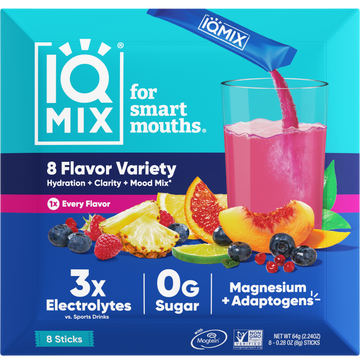Over the past several decades, many in the medical and nutritional communities have broadly categorized fats as “healthy" or "unhealthy”. Pretty much everyone agrees that trans fats (e.g., what fries are often cooked in) are terrible for us, and that mono- and poly-unsaturated fats (e.g., what nuts and avocados are packed with) are great for us, as long as we control our poly-unsaturated omega-6 intake.
Saturated fats are a different story. Despite being essential to human survival (e.g., critical to cholesterol creation, which enables hormone production), these fats have long received an arguably un-deserved bad rap for decades. Thankfully, perceptions are changing, but we’ll discuss that debate another day!
What Are MCTs?
The word MCTs is shorthand for medium-chain triglycerides, a special type of saturated fat that has become exceedingly popular of late. What makes them different is the length of their fatty acids. Whereas long-chain fatty acids contain 13-21 carbon atoms, medium-chain fatty acids contain 6-12.

What Foods Contain MCTs?
Foods high in MCTs are quite rare relative to those high in long-chain fatty acids. However, there are a few medium-chain standouts. Here's a quick list of foods that contain MCTs, shown as a percentage of total fats:
- Coconut oil: 15%
- Palm kernel oil: 7.9%
- Cheese: 7.3%
- Butter: 6.8%
- Milk: 6.9%
- Yogurt: 6.6%
Coconut’s unparalleled MCT content and dairy-free status have allowed it to emerge as the true rock star in the category. All IQ Bars are packed with coconut for just these reasons!

What Are The Benefits of MCTs?
Because MCTs have fewer carbon atoms than their long-chain peers, we digest them differently. Long-chain acids are packaged into structures called lipoproteins by the intestines, circulated in the bloodstream, and digested in the liver. In contrast, MCTs travel directly from the small intestine to the liver, where they’re metabolized into ketones, the brain’s only alternative fuel source to glucose – a derivative of carbs.
What’s attractive about ketones from a brain optimization standpoint is they’re a more efficient fuel than glucose. Not only do they come without the mental “crash” that glucose incurs, but they offer over 2X the potential energy per gram that carbs and protein does, and have been shown to produce ATP more efficiently. They've even been shown to improve quality of cognition (e.g., memory).

But MCT’s Aren’t The Only Way to Create Ketones!
It’s important to note that we don’t necessarily need MCTs to create brain-fueling ketones – we can also create these miracle molecules while fasting! When we restrict caloric intake, and burn through our liver’s glycogen (the stored form of glucose), our livers begin to break down our own body’s fat stores into ketones.

This is just one of the many reasons occasional fasting (often termed “intermittent fasting”) is so healthy for our brains. There's also a bonus benefit to fasting that isn't often referenced: a lighter grocery bill!




